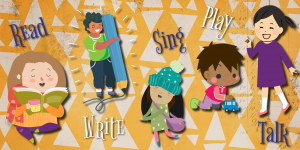
Early math skills are crucial for kindergarten readiness, and singing may be a way to help your little one build these skills! Research shows that singing to children starting at birth helps them develop spatial awareness, counting, and pattern recognition - all vital math skills for kindergarten.
Singing songs with lots of movement and problem solving helps young children develop spatial-temporal reasoning skills: the ability to mentally manipulate objects in space and time to solve multi-step problems. Everybody’s brain has the innate ability to imagine creating objects, and songs are a great way to help bring that skills to life! Try reading and singing along to “We’re Going on a Bear Hunt.” This is the perfect song to encourage young children to use their imaginations to create objects and solve problems! https://pima.bibliocommons.com/item/show/1531469091
Singing is also the perfect way help children learn to count too! There are so many fun counting songs that will engage little learners and help them memorize the order of our numbers. Try out “Counting Games and Rhymes for Little Ones” to get started.
Counting Games and Rhythms for the Little Ones
Beats and rhythms in music help young children learn patterns through movements and listening. By matching music with clapping or playing instruments, children can practice recognizing and translating simple patterns. Check out this documentary, Music and Movement in Early Learning on Kanopy, that talks all about how music and movement help develop young brains.
Babies (0-18 months)
- Use songs to help your infant understand transitions! A song for waking up, for play time, nap time, and other activities helps your infant learn their routine.
- Singing together as a family is a great way to help older siblings bond with their new baby brother or sister!
- Sing your baby their name! Substitute other words in songs with your baby’s name so they can hear it over and over again!
 Toddlers (18-36 months)
Toddlers (18-36 months)
- Toddlers are so curious and always on the go! Sing about whatever catches their attention – even if it’s a made-up song!
- Is your child reluctant to sing? Use the “Pause and Wait” method. While singing a familiar song, pause and wait for your child to fill in the next part. It’s okay if they don’t! It will still help them think about the next part of the song.
Preschoolers (3-5 year-olds)
- Sing important words of phrases! It’s easier for your children to learn important facts and memorize information if they have a melody and rhythm to go along with it!
- Hum, tap, or whistle popular songs and see if your child can guess what they are!
- Use Freegal on the library’s website to find new songs for your entire family!
-Kelli, Children's Librarian, Oro Valley Library
 Read, Write, Talk, Sing, Play!
Read, Write, Talk, Sing, Play!
Singing is incredibly engaging for children and has countless early literacy benefits, which include building vocabulary, slowing down language, developing memory skills, and so much more!
Read more about early literacy and how you can make a difference in your child's life.

